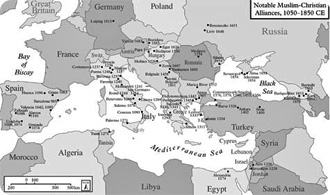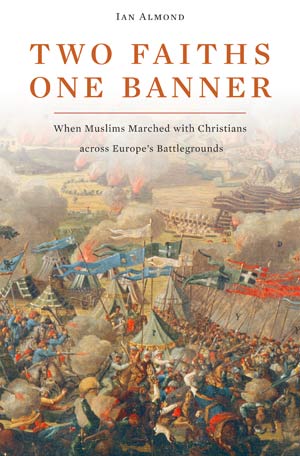
In many ways, Two Faiths, One Banner reveals how the history of Islam and the history of Europe are profoundly intertwined. In an age obsessed with Muslim-Christian so-called civilizational conflict, this book shows five periods in the history of Europe where Muslim and Christian soldiers actually fought on the same side, in the same armies, for the same cause.
The timeline of the book is huge – it goes from eleventh century Spain to nineteenth century Russia. There’s a map at the beginning of the book which shows the battlefields I refer to – where Muslims fought alongside Christians. Those battlefields are all over Europe, in Spain, in Italy, in Hungary, even in Germany. This, in a nutshell, is the aim: to demonstrate how the idea of a Christian Europe is simply a case of historical amnesia. Around the Mediterranean, Muslims, Jews and Christians have been sharing languages, food and music for over twelve hundred years.
“Some of the first English (Anglo-Saxon) coins had the stamp of the Caliphate on them.”
At the moment, we Europeans live in a “Fortress Europe.” We’re convinced that our continent – which is really nothing more than the westernmost ridge of Eurasia, and Britain nothing more than an archipelago off the edge of that ridge – is completely separate from Turkey, North Africa and the Middle East.
Historically, nothing could be further from the truth. Although for most people today, Islam seems to come from the planet Mars, the reality is that many parts of Europe (including Spain, Sicily and the Ukraine) were Muslim before they were Catholic or Orthodox. Arabs were meeting Vikings as early as the tenth century on the Volga, and we have records of Muslim merchants visiting Prague in 965 AD. Some of the first English (Anglo-Saxon) coins had the stamp of the Caliphate on them.
I started writing this book because of a TV debate I once saw. I lived in Turkey for six years. One afternoon, in my apartment in Istanbul, watching the BBC channel on satellite TV, I saw a discussion about whether Turkey should be allowed to enter the European Union. One particularly well-fed German, a member of the European Parliament, in the middle of the debate, casually threw out the remark: “Well, of course Turkey has never been a part of Europe.”
I felt so angry I got up and switched the TV off. Turkey not a part of Europe? Istanbul – Constantinople! – not a part of Europe? Where the early Church was established, where Aristotle taught, where Rome found its second capital, where Mozart set his Seraglio, where Greeks, Turks, Armenians and Italians lived together for centuries? Turkey not a part of Europe? It was then that I tried to think of a way I could empirically prove that Muslims did not belong to an “other” civilization but had always been involved in the heart of Europe. And suddenly a military history of Muslim-Christian alliances sprang to mind: why not try to find a selection of moments in the history of Europe where soldiers from both religions actually fought in the same army?
Before I started researching, I thought I would have to dig to for “exceptional” moments. I imagined I would probably find a half-dozen cases, which I would then dramatically unfold to fill a book of 90,000 words. It soon became clear that the opposite was true – European history was full of such cross-faith alliances. I would have needed ten books to fully document the material I found: Arab troops helping German emperors in Italian wars, Hungarian Calvinists supporting the Sultan in his march on Vienna, Catalans helping Muslims attack Castilians, Greek-Turkish alliances against their fellow Greeks.
The strangest thing was that all of this information was not necessarily “hidden.” On an academic level, the use of Christian troops in the Turkish armies of the Ottomans was common knowledge. But all of this knowledge had completely failed to enter the mainstream consciousness. The poly-faith history of Europe was widely acknowledged in the universities. But somehow this awareness had failed to trickle down into everyday public debate.
I suppose if I wanted any single moment of the book to be read by the random reader, it would be a particular battle, the battle of Cortenuova in the year 1237.
On the edge of Lake Como, at the foot of the Alps, this is probably the farthest north a Muslim infantry ever fought on the Italian mainland. Even today, eight centuries later, it is remarkable to think that over three thousand Arabic-speaking Muslims, fighting not as mercenaries but as official subjects for their German emperor, would passionately take part in the civil wars of the Italian cities as far north as the cold plains of Lombardy.
It is a consequence of our own historical ignorance that the picture of Italian Muslims, in the epoch of Dante and Aquinas, fighting the soldiers of Milan and Bologna against the backdrop of the Italian Alps, seems so strange. The simplistically “Christian Europe” we have all fallen so in love with, which gives us a tingle between the shoulder blades every time we visit a cathedral or listen to a fugue from Bach, has relied on the airbrushing-out of any trace of Islam or Judaism from the tradition. Until this process is reversed, the idea of Arabs fighting for the cities of Cremona and Ferrara, against the armies of Milan, will always sound absurd.

“Even on a much more anecdotal level – Da Vinci’s recently discovered Turkish/Arab mother, for example – we are becoming more and more aware of the interrelationship between Europe and the Middle East.”
The book has a couple of aims. The first is to re-think the idea of “Europe” as a place not of one religion but three, to try to re-connect our European history with a much older context. A whole variety of scholars are already doing this on a number of different levels: by showing how Arab literature produced narratives such as The Canterbury Tales and the Decameron, how Arab scribes were responsible for preserving much of Europe’s classical philosophical tradition. Even on a much more anecdotal level – Da Vinci’s recently discovered Turkish/Arab mother, for example – we are becoming more and more aware of the interrelationship between Europe and the Middle East.
A second aim is to show how the idea of a “clash of civilizations” is the kind of nonsense that historical ignorance breeds. Most of the problems this cliché is meant to “explain” – Afghanistan, Israeli-Palestine, Iraq, the attacks in Mumbai, the rise of fundamentalism in Egypt or Pakistan – actually have a whole set of much more concrete explanations. The real explanations for these conflicts are often uncomfortable for the West – they involve US support of Israeli brutality, gas pipelines in Afghanistan run by Californian pipeline companies, oil lobbies, frustration with Western-friendly corrupt regimes, Western approval of Indian Army atrocities in Kashmir. So it is easier to push the “Islam” button every time a conflict takes place.


Ian Almond is a British academic who teaches English Literature at Georgia State University in Atlanta. He has lived in many other parts of the world: Germany, Italy, India, and Turkey, where he taught for six years at Bogazici University in Istanbul. Almond considers himself to be a Christian Socialist. Besides the two books featured in his Rorotoko interviews, Two Faiths, One Banner (Harvard University Press/I.B.Tauris, 2009) and History of Islam in German Thought (Routledge, 2009), Ian Almond is also the author of Sufism and Deconstruction (Routledge, 2004), and The New Orientalists: Postmodern Representations of Islam (I.B.Tauris, 2007). His books have been translated into Arabic, Korean, Persian, Bosnian and Indonesian.